-
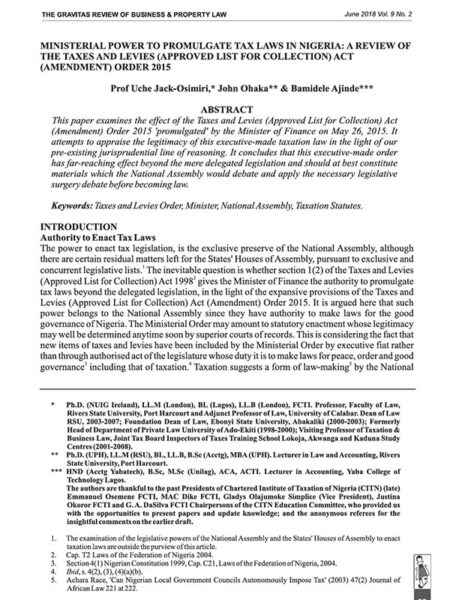
Ministerial Power to Promulgate Tax Laws in Nigeria: A Review of the Taxes and Levies (Approved List for Collection)Act (Amendment) Order 2015
0₦2,500.00Professor Uche Jack-Osimiri, John Ohaka and Bamidele Ajinde in their paper, Ministerial Power to Promulgate Tax Laws in Nigeria: A Review of the Taxes and Levies (Approved List for Collection) Act (Amendment) Order 2015 appraise the legitimacy of the Ministerial Order of 2015 in the light of pre-existing jurisprudential reasoning and case law. They posit that though section 1(2) of the Taxes and Levies (Approved List for Collection) Act 1998 provides that the Minister of Finance, may on the advice of the Joint Tax Board and by Order published in the Gazette, amend the Schedule to the Act, the Amendment Order of 2015 was shoddily done, lacks the necessary legislative rigour, and was most expansive as to belie the concept of delegated or subsidiary legislation.
-
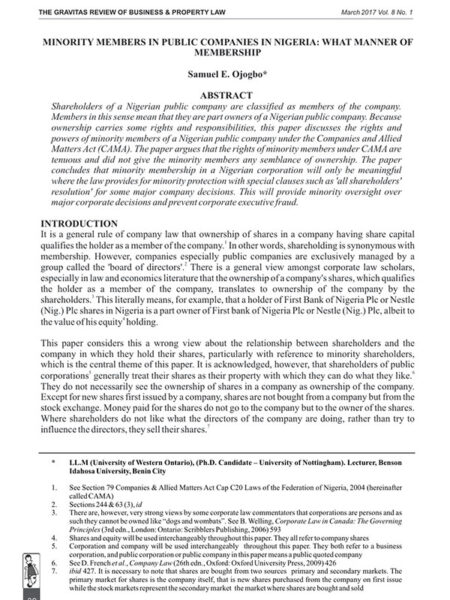
Minority Members in Public Companies in Nigeria: What Manner of Membership
0₦2,500.00Samuel Ojogbo of the Faculty of Law, Benson Idahosa University, Benin City in “Minority Members in Public Companies in Nigeria: What Manner of Membership” discusses the rights and powers of minority members of a Nigerian public company and argues that the rights of minority members are tenuous. He contends that the powers in a Nigerian listed company are in reality shared between the majority members and the board of directors. He posits that only the majority members with their insider knowledge and control of the corporation’s wealth and activities may properly be called the owners while the minority members, the so-called ‘corporate outsiders’, just make up the numbers. He concludes that the rights granted under section 300 of CAMA amount to little, as insider knowledge which a minority member lacks, is required to trigger the rights.
-
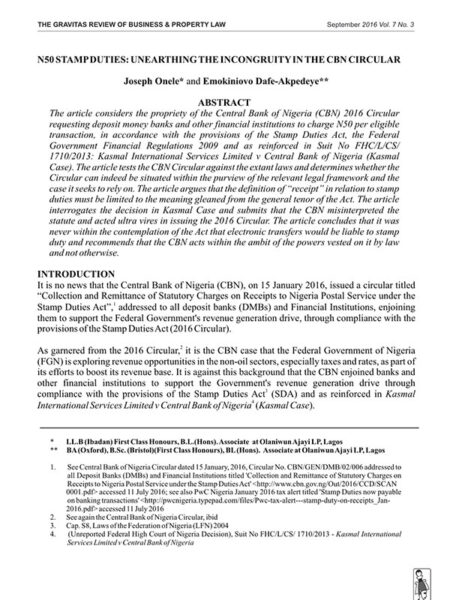
N50 Stamp Duties: Unearthing the Incongruity in the CBN Circular
0₦2,500.00Joseph Onele and Emokiniovo Dafe-Akpedeye of Olaniwun Ajayi LP, in their article “N50 Stamp Duties: Unearthing the Incongruity in the CBN Circular” examine the propriety of the Central Bank of Nigeria 2016 Circular by which Banks and other financial institutions are to charge N50 per eligible transaction. They consider the provisions of the Stamp Duties Act, the Federal Government Financial Regulations 2009 and other extant regulations, and conclude that it was never within the contemplation of the law that electronic transfers would be liable to stamp duty given that, among others, it is impracticable to issue a “receipt duly stamped”.
-
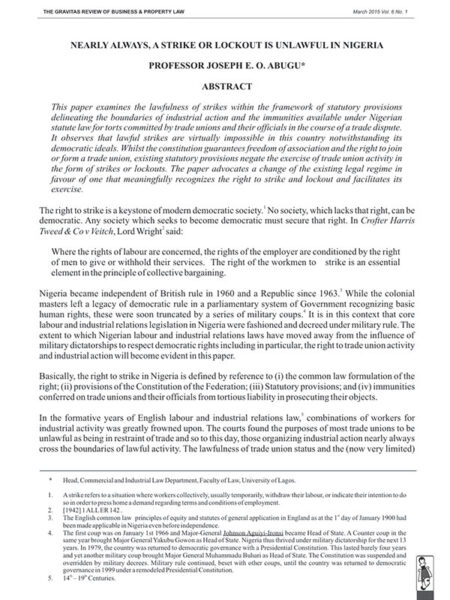
Nearly Always, A Strike or Lock Out is Unlawful in Nigeria
0₦2,500.00Professor Joseph Abugu, Head, Commercial and Industrial Law Department, Faculty of Law, University of Lagos examines the lawfulness of strikes within the framework of statutory provisions delineating the boundaries of industrial action and the immunities available under Nigerian statute law for torts committed by trade unions and their officials in the course of a trade dispute. It observes that lawful strikes are virtually impossible in this country notwithstanding its democratic ideals. Whilst the constitution guarantees freedom of association and the right to join or form a trade union, existing statutory provisions negate the exercise of trade union activity in the form of strikes or lockouts. The paper advocates a change of the existing legal regime in favour of one that meaningfully recognizes the right to strike and lockout and facilitates its exercise.
-
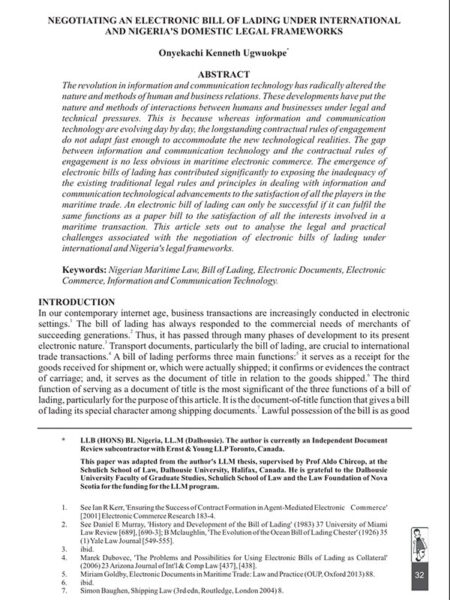
Negotiating an Electronic Bill of Lading under International and Nigeria’s Legal Frameworks
0₦2,500.00Onyekachi Ugwuokpe, Independent Document Review Subcontractor with Ernst & Young LLP Toronto Canada in his article, Negotiating an Electronic Bill of Lading under International and Nigeria’s Domestic Legal Frameworks, notes that although electronic bill of lading in shipping business has great advantages, including savings in time and monetary costs, it has been difficult to replicate the document-of-title function of a bill of lading in an electronic setting. The difficulty for an electronic bill to achieve negotiability arises from the fact that much of the relevant existing legal rules on, and commercial procedures for, negotiating bills of lading are entirely paper-based. The electronic bill of lading is also caught up with the common challenges of electronic documentation, which results from the inability of traditional contract principles to catch up with the rebellious advancements in information and communication technology. Onyekachi masterfully analyses the legal and practical challenges associated with negotiating electronic bills of lading under international and Nigeria’s legal frameworks.
-
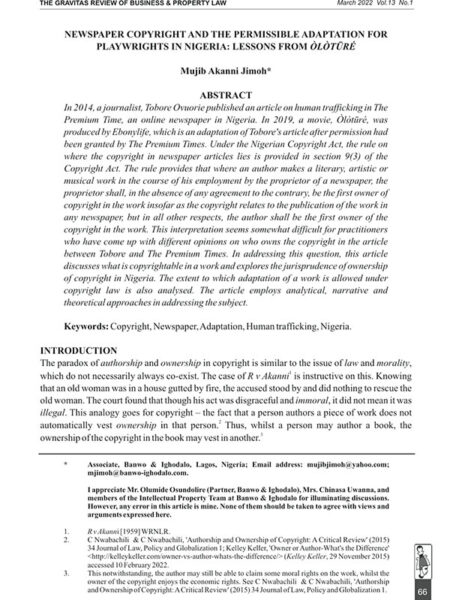
Newspaper Copyright and the Permissible Adaption for Playwrights in Nigeria: Lessons from Òlòtūré
0₦2,500.00Mujib Jimoh, Associate, Banwo & Ighodalo, Lagos, Nigeria, in his article, Newspaper Copyright and the Permissible Adaption for Playwrights in Nigeria: Lessons from Òlòtūré, explains that in 2014, a journalist, Tobore Ovuorie published an article on human trafficking in The Premium Times, an online newspaper in Nigeria. In 2019, a movie, Òlòtūré, which became a Netflix blockbuster, was produced by Ebonylife, which is an adaptation of Tobore’s article after permission had been granted by The Premium Times. Tobore posited that she ought to grant the permission. Under the Nigerian Copyright Act, the rule on where the copyright in newspaper articles lies is provided in section 9(3). There were differing interpretations of section 9(3) by practitioners. In this brilliant article, Mujib dissects the differing claims and interpretations. He discusses what is copyrightable in a work, the jurisprudence of ownership of copyright in Nigeria, and the extent to which adaptation of a work is allowed under copyright law.
-
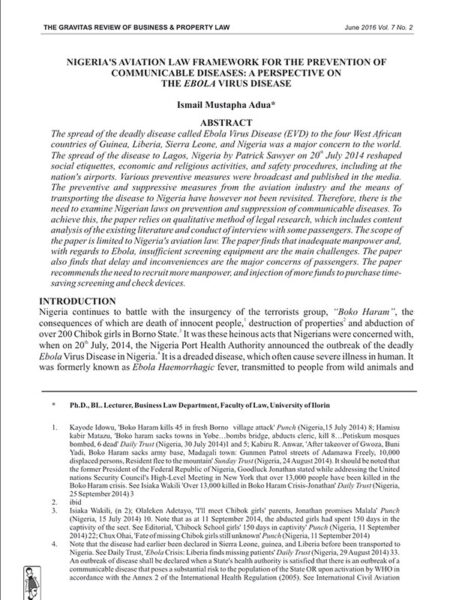
Nigeria’s Aviation Law Framework for the Prevention of Communicable Diseases: A Perspective on the Ebola Virus Disease
0₦2,500.00Dr Ismail Adua, Lecturer, Business Law Department, Faculty of Law, University of Ilorin in “Nigeria’s Aviation Law Framework for the Prevention of Communicable Diseases: A Perspective on the Ebola Virus Disease” examines the scourge of Ebola Virus Disease (EVD) that gripped the nation in 2014. Analysing the measures taken by relevant authorities to combat the menace, Dr Adua uses the EVD saga as a template to critically examine Nigeria’s Aviation laws and international conventions on prevention and suppression of communicable diseases.
-
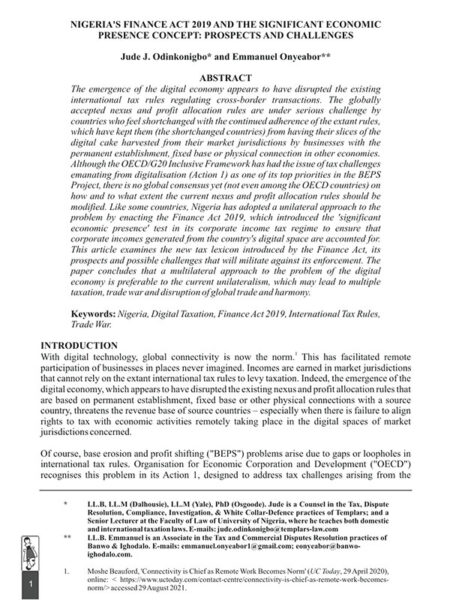
Nigeria’s Finance Act 2019 and the Significant Economic Presence Concept: Prospects and Challenges
0₦2,500.00Dr Jude Odinkonigbo of Templars, and a Senior Lecturer at the Faculty of Law University of Nigeria, and Emmanuel Onyeabor of Banwo & Ighodalo, in their article, Nigeria’s Finance Act 2019 and the Significant Economic Presence Concept: Prospects and Challenges, note that the emergence of the digital economy has significantly disrupted the existing international tax rules regulating cross-border transactions. They examine how Nigeria has tried to solve this problem by enacting the Finance Act 2019, which introduced the ‘significant economic presence’ test, with the objectives of ensuring that corporate incomes generated from Nigeria’s digital space are liable to tax. They note Nigeria’s unilateral adoption of the OECD ‘Significant Economic Presence Test’ on the taxation of Non-Resident Companies (NRCs) in the Finance Act. They consider the prospects and challenges the country might have enforcing the taxation of NRCs operating in the country’s digital space, including the possibility of retaliatory measures by other countries. They conclude with suggestions on how to enforce the provisions of the Finance Act.
-
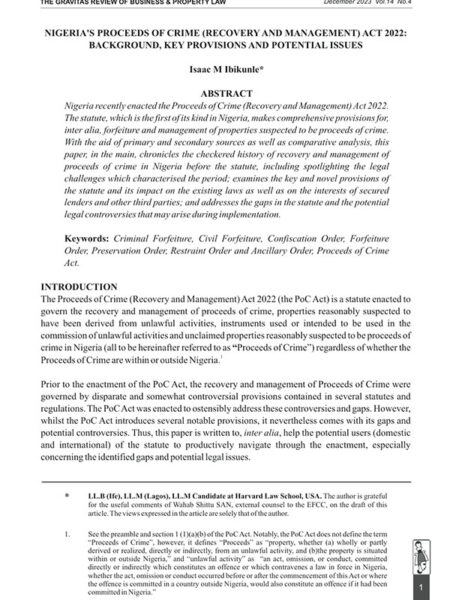
Nigeria’s Proceeds of Crime (Recovery and Management) Act 2022: Background, Key Provisions and Potential Issues
0₦2,500.00Isaac Ibikunle, in his article, Nigeria’s Proceeds of Crime (Recovery and Management) Act 2022: A Review of Key Provisions and Issues Arising, examines Nigeria’s recently enacted Proceeds of Crime (Recovery and Management) Act 2022. The statute, which is the first of its kind in Nigeria, makes comprehensive provisions for forfeiture and management of properties suspected to be proceeds of crime. With the aid of primary and secondary sources as well as comparative analysis, Ibikunle chronicles the checkered history of recovery and management of proceeds of crime in Nigeria prior to the statute, including spotlighting the legal challenges which characterised the period; examines the key and novel provisions of the statute and its impact on the existing laws as well as on the interests of secured lenders and other third parties; and addresses the gaps in the statute and the potential legal controversies that may arise during implementation.
-
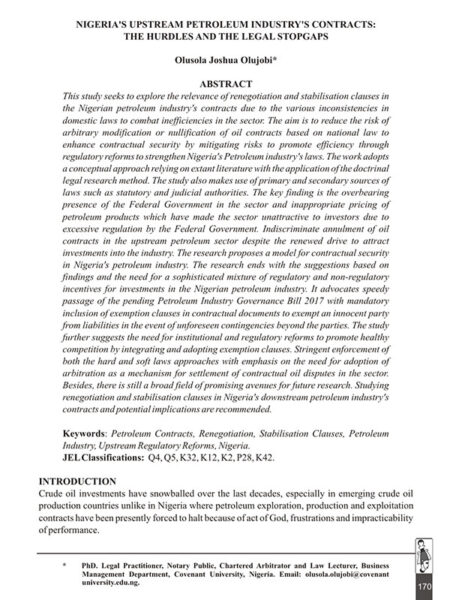
Nigeria’s Upstream Petroleum Industry’s Contracts: The Hurdles and the Legal Stopgaps
0₦2,500.00Dr Olusola Olujobi of the Business Management Department Covenant University Ota Nigeria in his article, Nigeria’s Upstream Petroleum Industry’s Contracts: The Hurdles and the Legal Stopgaps, explores the relevance of renegotiation and stabilisation clauses in the Nigerian petroleum industry’s contracts due to the various inconsistencies in domestic laws to combat inefficiencies in the sector. The overbearing presence of the Federal Government in the oil and gas sector and inappropriate pricing of petroleum products have made the sector unattractive to investors due to excessive regulation. Indiscriminate annulment of oil contracts is contrary to the government’s drive to attract investments and the need for contractual security in Nigeria’s petroleum industry. Dr Olujobi advocates the need for speedy passage of the Petroleum Industry Governance Bill 2017 and for institutional and regulatory reforms to promote healthy competition.
-

Nigerian Company and Securities Law Reports (NCSLR) 1958-2017 Volumes 1-7
0₦75,000.00Nigerian Company and Securities Law Reports (NCSLR) 1958-2017 Volumes 1-7, edited by Professor Joseph Abugu, and published by The Gravitas Legal and Business Resources Limited, is a composite compendium of superior court decisions on Corporate and Securities law.
-
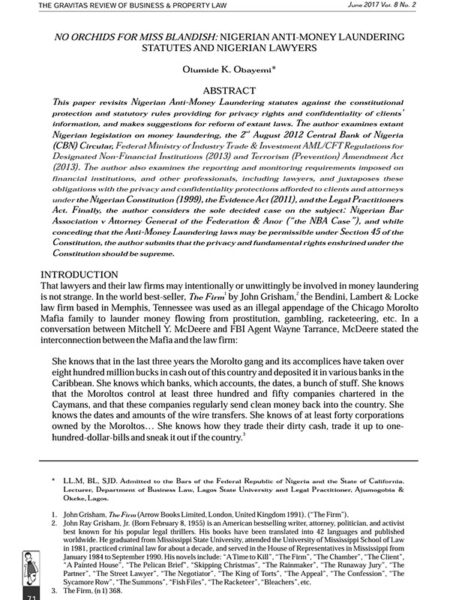
No Orchids For Miss Blandish: Nigerian Anti-Money Laundering Statutes and Nigerian Lawyers
0₦2,500.00Dr Olumide Obayemi of the Lagos State University and Legal Practitioner, Ajumogobia & Okeke, Lagos in his article, “No Orchids For Miss Blandish: Nigerian Anti-Money Laundering Statutes and Nigerian Lawyers” examines the concept of money laundering and comprehensively reviews extant Nigerian legislation and regulations on money laundering including the 2 August 2012 Central Bank of Nigeria Circular, Federal Ministry of Industry Trade & Investment AML/CFT Regulations for Designated No the Terrorism (Prevention) Amendment Act (2013). He examines the reporting and monitoring requirements imposed on financial institutions, and other professionals, including lawyers, and juxtaposes these obligations with the privacy and confidentiality protections afforded to clients and lawyers under the Nigerian Constitution (1999), the Evidence Act (2011), and the Legal Practitioners Act. He considers the case of the Nigerian Bar Association v Attorney General of the Federation on the issue and draws his conclusion.
The Gravitas Review of Business & Property Law



